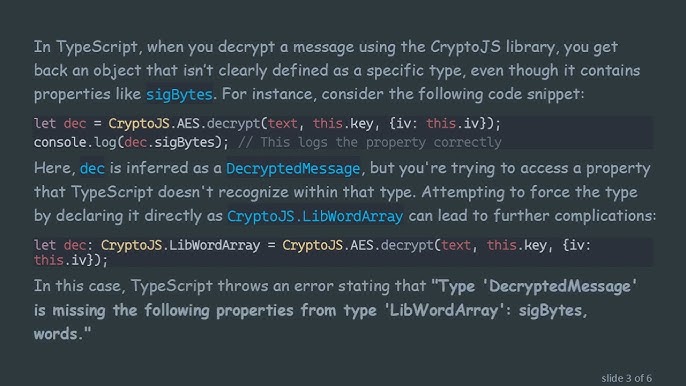
Introduction
To avoid a Typescript-Eslint No-Unsafe-Assignment warning, ensure to assign accurate types to your variables rather than deploying the ‘any’ value, promoting secure programming mechanics and enhancing code readability.
Quick Summary
When discussing Typescript-Eslint’s `no-unsafe-assignment` rule in conjunction with the “Any” value, it is crucial to understand firstly what these components are individually as well, and subsequently how they interact with each other.
Consider firstly, ‘Typescript’: an open-source language developed by Microsoft that brings static type-checking to JavaScript. It helps spot bugs early by providing types, interfaces, and type inference.
Next, we have ‘eslint’. ESLint is a tool for identifying and reporting on patterns in JavaScript. ESLint’s `no-unsafe-assignment` rule, specifically, guards against the assignment of values from unsafe sources or of mismatched types which could potentially lead to bugs.
The ‘Any’ value, most crucial amongst our trio, represents any JavaScript value, allowing you to opt-out of type-checking. However, its misuse can lead to potential problems and difficult-to-debug code.
| Component | Description/th> |
|---|---|
| Typescript | An open-source programming language developed by Microsoft, that adds static types succinctly to JavaScript, aiding in code reliability. |
| Eslint No-Unsafe-Assignment Rule | A rule in ESLint that warns programmers about assignments that might potentially cause bugs due to unsafe sources or mismatches in type. |
| Any Value | A type in TypeScript that signifies any possible JavaScript value. While it allows some flexibility, overuse or misuse can lead type-checking errors and problematic code. |
Now let’s discuss briefly how these interact: while Typescript’s strong typing significantly reduces the likelihood of runtime errors, ‘Any’ types can circumvent this advantage. If you assign an ‘Any’ type to a variable, Typescript no longer checks its type, potentially leading to bugs. Hence, the `no-unsafe-assignment` rule can help you identify such instances where an ‘Any’ value might be assigned unsafely.
To illustrate with a simple example:
typescript
let foo: any = “hello”;
let bar: number = foo; // TypeScript will throw an error here if no-unsafe-assignment is enabled.
The second line of code will cause Eslint to emit an error if the `no-unsafe-assignment` rule is enabled because an ‘Any’ value is being assigned to a ‘number’ type.
As [Doug Crockford](https://www.brainyquote.com/authors/doug-crockford-quotes), creator of JSON and a profound voice in the tech space, once stated, “The good thing about reinventing the wheel is that you can get a round one”. This quote reinforces our understanding about maintaining safety and code quality by limiting the unsafe use of ‘Any’ values.
Understanding the Concept of Typescript-Eslint No-Unsafe-Assignment

The Typescript-ESLint management tool comprises a set of rules designed to help developers write safer, more effective TypeScript code. Among these rules is the ‘no-unsafe-assignment’ regulation, which focuses on dissuading developers from employing any form of unsafe assignment of an ‘any’ value within their project’s source code.
Conceptualizing ‘no-unsafe-assignment’
‘No-unsafe-assignment’ chiefly alerts developers when they assign values from variables that are assigned as ‘any’ types. This rule aims to discourage programmers from bypassing or ignoring TypeScript’s inherent type-safety benefits and mandates. By disabling or dismantling TypeScript’s type-checking features, developers risk running into issues during runtime, impacting error detection and debugging efficiency.
An Illustrative Example
let variableAny: any; let variableString: string; variableString = variableAny;
In the above example,
variableAny
has no explicit type defined, rendering it an ‘any’ type in TypeScript’s eyes. Upon assigning its value to
variableString
(whose type has explicitly been declared as ‘string’), an error would be thrown by the ESLint engine due to violation of the ‘no-unsafe-assignment’ rule.
Resolving ‘no-unsafe-assignment’
To address this problem, you must consider providing concrete type definition instead of using the ‘any’ type. In TypeScript, applying specific types strengthens the potent static typing architecture, enabling developers to catch errors efficiently at compile-time rather than at runtime.
Email Etiquette Rules
For instance, instead of assigning the ‘any’ type, an explicit type assignment can effectively manage this:
let variableAny: unknown;
let variableString: string;
if(typeof variableAny === 'string'){
variableString = variableAny;
}
The ‘no-unsafe-assignment’ rule encourages developers to leverage TypeScript’s full potential and work with the certainty of type safety. By doing so, developers create a more robust, reliable, and efficient application, enhancing both user experience and code maintainability.
As Nick Scialli once stated, “TypeScript is not about guaranteeing that your code is free of bugs; it’s about catching the most common mistakes with less effort and time.”
Decoding the Errors: “Unsafe Assignment Of An Any Value”

The error “Unsafe Assignment of an Any Value” has a significant meaning in TypeScript development. In simple terms, it is generated when one is attempting to assign the `any` type variable value to another variable that has a defined TypeScript type.
TypeScript-Eslint’s rule `no-unsafe-assignment` vigilantly warns developers when this sort of scenario occurs. The purpose behind it is to help enforce TypeSafety, a principle aspect that makes TypeScript standout as compared to JavaScript.
Understandably, the very essence of using TypeScript is to leverage static typing for catching errors during compile time, rather than runtime like in JavaScript. By applying loose `any` values without constraint, unintentionally, one may drift against the benefits provided by TypeScript, potentially leading to troublesome bugs that are harder to track.
Let’s delve into a brief example:
Consider we have a function that accepts a parameter of type `any` and assigns its value to another variable of known type.
function unsafeExample(value: any) {
let numberValue: number;
numberValue = value;
}
In this instance, TypeScript-Eslint will display an `Unsafe assignment of an any value`warning. This is because `value` is not guaranteed to always be a number, yet it’s assigned to `numberValue` which only expects numerical entries.
One way to mitigate this issue and adhere to TypeScript-Eslint’s `no-unsafe-assignment` rule would be through Type Checks or Type Assertions. Here’s an illustration:
function safeExample(value: any) {
let numberValue: number;
if(typeof value === 'number'){
numberValue = value;
} else {
console.log('Invalid value passed');
}
}
Here, a check is performed before assignment. If the value isn’t a number, there won’t be an assignment, hence preventing `Unsafe Assignment of an Any Value` warning.
In TypeScript’s ecosystem, every precaution taken to ensure TypeSafety bolsters code quality and aids in maintaining a cleaner, bug-free format.
“It’s hard enough to find an error in your code when you’re looking for it; it’s even harder when you’ve assumed your code is error-free.” — Steve McConnell
Online reference: ESLint – no-unsafe-assignment
Practical Strategies to Avoid Unsafe Assignments in TypeScript-Eslint

The TypeScript-Eslint No-Unsafe-Assignment rule plays a crucial role in adaptive programming. It helps mitigate the risk of unsafe code execution by restricting the assignment of `any` values. Primarily, it aims to protect the structural integrity and functional efficiency of your application by facilitating safer assignments.
Let’s understand the concept first: TypeScript employs type safety as one of its core strengths. When assigning variables or properties, each follows explicit or inferred types. Nevertheless, TypeScript provides an escape hatch – the `any` type that can potentially bring the entire type system to its knees. The `any` value bypasses type-checking completely, making it susceptible to throwing unpredictable runtime errors.
Now, how do we avoid unsafe assignments? Below we provide some feasible strategies:
1. Preferential use of unknown over any: In scenarios where you’re uncertain about a variable’s type, it is recommended to utilize the ‘unknown’ type rather than ‘any’. This forces you to carry out necessary type checking before manipulating the variable.
Contrast the following examples to illustrate this:
code
let a: any = “I could be anything”;
a.trim(); // This will compile but might fail at runtime
let b: unknown = “I could be anything”;
b.trim(); // This won’t compile because TypeScript doesn’t know if b has a .trim() method
2. Type inference and declaration: TypeScript features robust capabilities for type inference which minimize the necessity for direct type definitions. Leverage them whenever possible.
3. Usage of Type Guard Functions: These are functions that perform type checking. TypeScript recognizes their return type as a type predicate.
Lastly, while restructuring your project to entirely eliminate the usage of `any` could be taxing and possibly extraneous, introducing incremental checks could be a viable alternative. Start by enabling typescript-eslint/no-unsafe-assignment rule in your eslint config file, and over time, pay down the debt of `any` usage whenever working on parts of the system. Being intentional in enabling type guards and leveraging type inference would go a long way.
As Amiad Hadad said: “In a large code base with many developers involved, using ‘any’ can be disastrous. It’s like shooting in the dark, disregarding TypeScript’s superpowers.”
That’s where TypeScript-eslint No-Unsafe-Assignment rule comes into play – a vanguard in maintaining your system’s safety and performance.
How TypeScript’s Strict Typing Standards Impact Eslint No-Unsafe-Assignment

TypeScript, a statically-typed superset of JavaScript, serves to introduce robust typing structures into your code – facilitating better documentation of functions, ensuring type consistency across variables, and granting the ability to catch potential bugs at compile-time instead of runtime. TypeScript’s stringent handling of types can profoundly impact the execution of certain rules in Eslint, one of which is no-unsafe-assignment.
The Intersection of TypeScript and Eslint No-Unsafe-Assignment
In simple terms, Eslint’s rule of ‘no-unsafe-assignment’ disallows the assignment of values with more permissive types (any) to variables with less permissive or specific types. This rule checks for unsafe assignments of values with any type to variables, properties, and array elements. How TypeScript plays a significant role here ties back to its foundational insistence on maintaining strong, non-inferior type safety.
Selecting –strictTrue as part our TypeScript configuration helps us proactively prevent common JavaScript errors during code writing phase itself. Particularly, in cases of an “any” assignment, this flag along with no-unsafe-assignment in ESLint ensures that developers are consciously making ‘any’ type decisions rather than accidentally creating less maintainable and harder-to-debug code.
Code Example:
Given the following TypeScript code snippet:
interface User {
name: string;
age: number;
}
let user: any = { name: 'John Doe', age: 30 };
let myUser: User = user;
This code would be flagged by Eslint’s no-unsafe-assignment rule. The user variable is of ‘any’ type and its assignment to myUser, which is of a more specific User interface type, goes contrary to strict type safety.
The Value of Strict Type Safety
Elaborating on the significance of strict type safety, eminent developer Robert C. Martin, articulately encapsulated it in the following way:
“Our inability to handle complexity is the main source of defects. TypeScript and strong static typing help us manage this complexity.”
Such precise management of code complexity is crucial for large scale projects where even small bugs or inconsistencies can scale into significant problems.
Key Takeaway
In essence, the intersection of TypeScript’s rigid typing provisions with Eslint’s no-unsafe-assignment rule works to enhance code quality, readability, and maintainability by ensuring that type assignments adhere strictly to the defined rules.
Conclusion
<p>The issue encapsulated by Typescript-Eslint: No-Unsafe-Assignment, importantly incorporates unsafe assignment of an ‘any’ value. This rule principally disallows the conduct of assigning variables of type ‘any’. Indisputably it’s an integrated linting tool specifically for TypeScript which strengthens code quality through automating the identification and eradication of antipatterns or potential areas of concern. Moreover, its role within programming contexts can be instrumental in minimizing potential coding defects and enhancing efficiency.</p>
<p>
Comprehending how to leverage the Typescript-Eslint: No-Unsafe-Assignment feature entails a grasp of TypeScript semantics. The ‘any’ type in TypeScript is potentially hazardous as it subverts the benefits that static typing brings – like early-error checking and autocompletion – essentially transforming portions of your code into dynamically-typed language.
</p>
<table border=”1″>
<tr>
<td><code>let someVariable: any = 5;</code></td>
</tr>
<tr>
<td><code>let someOtherVariable: number = someVariable;// No error when assigning</code></td>
</tr>
</table>
<p>In this case, if `someVariable` isn’t in actuality a number, we’ve unwittingly introduced a bug in `someOtherVariable`. Avoiding using any and configuring no-unsafe-assignment helps us maintain sanity checks in our codes.</p>
<p>As Brian Kernighan, one of the creators of C programming language quoted “Debugging is twice as hard as writing the code in the first place. Therefore, if you write the code as cleverly as possible, you are, by definition, not smart enough to debug it.”</p>
<p>There’s no arguing that Typescript-Eslint No-Unsafe-Assignment provides a valuable safety net for developers, particularly relating to type-checking discipline, enabling you to write safer and more maintainable code.</p>



